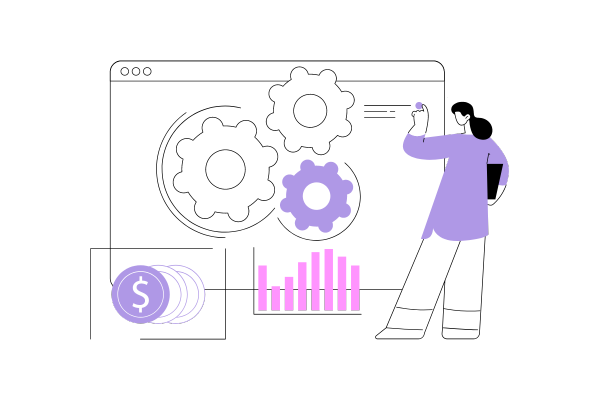Last Updated on September 9, 2025 by Becky Halls
Backlinks are one of the few SEO investments that can directly impact your rankings, traffic, and brand authority. But lets talk ‘backlinks price’ and how much should you really expect to pay for them in 2025? Prices vary widely depending on the quality of the site, the type of link, and the level of editorial control, but one thing is clear: backlink pricing has become more transparent, more competitive, and more important than ever.
To help you cut through the noise, here are the core facts you need up front:
Key Takeaways on Backlinks Prices in 2025
-
💰 Average cost of a backlink now ranges from $350 to $500, with premium editorial links reaching $2,500+.
-
📊 Price factors include domain authority, traffic volume, niche relevance, and link type (guest post, digital PR, insertion).
-
🔍 Quality beats quantity: one strong, contextually relevant link often outperforms dozens of low-tier placements.
-
⏱ Positive ROI: 78% of SEOs report profitable returns, with ranking improvements usually seen within 1–6 months.
-
🌐 2025 trends: backlink costs continue to rise, relevance is prioritized over raw DR, and AI tools are increasingly used to monitor link health.

What are Backlinks and Why Are They Important for SEO?
Backlinks, also known as inbound links or external links, are hyperlinks on other websites that direct users to your website. They are crucial for search engine optimization (SEO) as they serve as a signal to search engines about the quality and relevance of your website. When reputable websites link to your site, it signals to search engines that your content is valuable and worth ranking higher in search results.
The importance of backlinks for SEO cannot be overstated. They are one of the top ranking factors for search engines like Google. Websites with a strong backlink profile tend to rank higher in search results, driving more organic traffic and increasing visibility to potential customers. Backlinks also contribute to establishing your website’s authority and credibility within your industry or niche.
Factors Influencing the Backlinks Price
When considering the pricing of backlinks, it’s essential to delve into various factors that influence their cost. Here are some key considerations:
1. Domain Authority (DA) of the Linking Site: Domain authority, a metric developed by Moz, predicts a website’s ranking potential on search engine result pages (SERPs). Websites with higher DA scores typically command higher prices for backlinks. For instance, acquiring a backlink from a website with a DA of 70 or above might be more costly than from a site with a DA below 50.
2. Relevance to Your Niche or Industry: Buying links from websites that closely align with your niche or industry are generally more valuable. For example, if you run a fitness blog, a backlink from a health and wellness website carries more weight than one from a technology blog. This relevance enhances the backlink’s SEO value and might increase its price.
3. Placement of the Backlink: The location of the backlink on the linking site matters. Backlinks embedded within the body of a high-traffic, relevant page are considered prime real estate and command higher prices. Conversely, backlinks in less prominent locations like footers or sidebars may cost less due to their lower visibility and impact.

4. Quantity and Quality of Backlinks: The number and quality of backlinks you purchase influence pricing. High-quality backlinks from authoritative sources typically come at a premium compared to lower quality ones. Additionally, buying multiple backlinks may qualify you for bulk discounts, but it’s crucial to prioritize quality over quantity.
5. Linking Site’s Traffic and Engagement Metrics: Websites with significant traffic and strong engagement metrics often charge higher prices for backlinks. Metrics like page views, average time on site, and bounce rates are indicators of a site’s popularity and influence. Backlinks from such sites can drive substantial referral traffic, making them more expensive but potentially more rewarding investments.
By carefully considering these factors, you can make informed decisions when purchasing backlinks and ensure that your investment aligns with your SEO goals and budget.
Expect to pay more for link quality: in 2025, SEOs say a single high-quality backlink costs about $509 on average, and 80.9% believe prices will continue climbing.(Editorial.Link) Meanwhile, BuzzStream reports guest-post links average $365, with top-tier options nearing $930, and digital PR links ranging between $1,250–$1,500.(BuzzStream)
Different Backlinks Price Models
When considering different pricing models for purchasing backlinks, it’s crucial to explore various options to find the best fit for your needs. Here’s a breakdown of some common pricing models and what to consider for each:
1. Pay-per-link Pricing: This model involves paying a fixed price for each individual backlink acquired. Prices can vary widely based on factors like domain authority, relevance, and placement. For example, a backlink from a high-authority site with relevant content might cost more than one from a lower-authority site with less relevance. When opting for pay-per-link pricing, it’s essential to assess the quality of each potential backlink to ensure you’re getting value for your money.
2. Monthly Subscription Pricing: Some link building services, or a link building agency, can offer monthly subscription packages that provide a predetermined number of backlinks each month. These packages can offer a cost-effective way to steadily build your backlink profile over time. However, it’s essential to evaluate the quality and relevance of the backlinks included in the subscription to ensure they align with your SEO goals and target audience.
3. Custom Outreach and Negotiation Pricing: In this model, the price of backlinks is determined through custom outreach and negotiation with website owners. This approach allows for more flexibility in pricing and can result in obtaining high-quality backlinks at a reasonable cost. When engaging in custom outreach and negotiation, it’s essential to communicate clearly with website owners and establish mutually beneficial partnerships.

4. Value-based Pricing: Value-based pricing considers the overall value that the backlink will bring to your website in terms of SEO benefits, organic traffic, and potential revenue. This model focuses on the return on investment (ROI) of the backlink rather than just the upfront cost. When evaluating backlinks based on value-based pricing, consider factors like the website’s domain authority, relevance to your niche, and potential referral traffic. Additionally, track the performance of acquired backlinks over time to assess their impact on your website’s SEO and overall success.
At the very top tier, editorial backlinks command a hefty price ($2,000 to $2,500 per link) but yield measurable benefits: nearly 9 in 10 SEOs report ranking improvements within 1–6 months, and 78% say link building pays off in real ROI. (PressWhizz)
By understanding these different pricing models and considering factors like quality, relevance, and long-term value, you can make informed decisions when purchasing backlinks and maximize the effectiveness of your link building efforts.
Understanding the Value of Backlinks for Your SEO Strategy
Understanding the value of backlinks is essential for developing a robust SEO strategy that yields tangible results. Beyond their impact on pricing, backlinks offer a myriad of benefits that can significantly enhance your website’s performance and online presence. Here’s a deeper look into the value of backlinks for your SEO strategy:
1. Increased Organic Traffic: Quality backlinks from relevant and authoritative websites serve as pathways for referral traffic to flow to your site. When users click on these backlinks, they’re directed to your website, resulting in an uptick in organic traffic. By strategically acquiring backlinks from reputable sources, you can expand your website’s reach and attract a broader audience.
2. Improved Search Engine Rankings: Backlinks are a fundamental ranking factor for search engines like Google. When your website receives backlinks from high-quality, authoritative sites, it sends positive signals to search engine algorithms, indicating that your content is valuable and deserving of higher rankings. As a result, your website’s position in search results can improve, leading to increased visibility and click-through rates.
Google’s Core Updates and their Impact on Backlink Value
Google’s core algorithm updates continuously shape how backlinks influence SEO rankings. These updates can recalibrate the importance placed on backlinks, affecting their ability to impact search results. For instance, updates often refine Google’s understanding of link quality, focusing on relevance and authority rather than sheer volume. Website owners must stay updated with these changes to ensure that their backlink strategies align with the latest criteria set by Google’s algorithm, thereby maintaining or improving their search rankings.
3. Enhanced Website Authority and Credibility: Backlinks from reputable websites act as votes of confidence in your content and brand. When other sites link to your website, it signals to both search engines and users that your site is a trusted source of information within your industry or niche. As your website accumulates backlinks from authoritative sources, its authority and credibility within the online ecosystem grow, bolstering its reputation and standing in the eyes of search engines.
4. Higher Conversion Rates: With increased organic traffic and improved credibility, your website is poised to experience higher conversion rates. Visitors are more likely to engage with your content, products, or services when they perceive your website as trustworthy and authoritative. By leveraging the power of backlinks to drive targeted traffic to your site, you can nurture leads and convert them into paying customers more effectively.

The Role of Content Quality in Backlink Success
High-quality content is a cornerstone for attracting valuable backlinks. Websites that produce unique, informative, and engaging content naturally draw links from authoritative sources. Strategies to enhance content quality include focusing on niche-specific insights, leveraging data and research, and incorporating multimedia elements. Crafting well-researched articles, case studies, or in-depth guides can generate interest from other websites seeking to link to credible sources, thereby enhancing your backlink profile and SEO.
5. Long-term Benefits for SEO Efforts: Building a strong backlink profile isn’t just about immediate gains—it’s an investment in the long-term success of your SEO efforts. Quality backlinks have a lasting impact on your website’s visibility and authority, contributing to sustained organic traffic and rankings over time. By consistently acquiring relevant and high-quality backlinks and maintaining a strong backlink profile, you can future-proof your SEO strategy and solidify your website’s position in the competitive digital landscape.
Making Informed Decisions When Purchasing Backlinks
When it comes to purchasing backlinks, it’s crucial to approach the process with caution and diligence to ensure that you’re making informed decisions that benefit your website’s SEO. Here are some helpful tips to guide you along the way:
1. Set a Realistic Backlinks Price and Budget: Before diving into backlink acquisition, establish a clear budget that aligns with your SEO goals and overall marketing strategy. Consider the potential return on investment (ROI) of backlinks and allocate your budget accordingly to maximize the impact of your investment.
2. Prioritize Quality Over Quantity: When evaluating potential backlink opportunities, focus on quality over quantity. It’s far more beneficial to acquire backlinks from authoritative, relevant, and reputable websites, even if it means investing more upfront. Quality backlinks carry more weight with search engines and can have a more significant impact on your website’s SEO performance and improving search engine rankings.
3. Evaluate Cost Versus Value: While it’s essential to consider the cost of acquiring backlinks, don’t solely focus on price. Instead, weigh the potential long-term value of backlinks against their upfront cost. A higher initial investment in quality backlinks may yield greater returns over time in terms of improving search engine rankings, organic traffic, and conversion rates.
4. Steer Clear of Black Hat Practices: Avoid engaging in black hat SEO practices such as buying links from link farms or participating in link schemes. These unethical tactics can lead to penalties from search engines and harm your website’s reputation in the long run. Instead, focus on building a natural and diverse backlink profile through legitimate means.

Ethical Considerations in Backlink Acquisition
When acquiring backlinks, adhering to ethical practices is paramount. Google’s Webmaster Guidelines advise against link schemes designed to manipulate rankings. These unethical practices include buying links without editorial oversight or engaging with sites created solely for link exchanges. Instead, focus on organic growth strategies like earning links through high-quality, relevant content that naturally gains attention. Transparency with linking partners and ensuring links are contextually relevant can maintain trust and avoid penalties, ensuring long-term SEO success.
5. Diversify Your Backlink Portfolio: Aim to build a diverse backlink profile by acquiring links from a variety of sources, including guest post links, industry directories, and reputable websites within your niche. Diversification not only strengthens your backlink profile but also reduces the risk of overreliance on any single source.
6. Stay Informed About Google Guidelines: Staying informed about Google’s Webmaster Guidelines is paramount for any website owner or SEO practitioner. These guidelines outline Google’s expectations and best practices for website owners to follow, ensuring a fair and transparent online ecosystem. One essential aspect of these guidelines is the prohibition against the buying and selling of backlinks. To adhere to Google’s guidelines, it’s crucial to understand the quality and relevance of backlinks pointing to your website. Tools like Ahrefs Site Explorer and Ahrefs Free Backlink Checker can be invaluable resources for evaluating your backlink profile. Ahrefs Site Explorer provides comprehensive insights into your website’s backlink profile, allowing you to analyze the quality of incoming links, identify potentially harmful backlinks, and monitor changes over time. On the other hand, Ahrefs Free Backlink Checker offers a quick and easy way to check the backlinks pointing to any website, providing valuable data on referring domains, anchor text, and more.
Comparison of DoFollow vs. NoFollow Links in SEO
DoFollow and NoFollow links play distinct roles in SEO. DoFollow links are counted towards SEO rankings, passing on link juice to support a site’s authority. Conversely, NoFollow links, initially designed to combat spam, do not directly affect rankings. Despite this, they hold value by building a natural backlink profile and attracting referral traffic. Balancing both types allows for a healthier link profile, reflecting genuine endorsements and maintaining Google compliance.
How much do paid guest posts cost?
The cost of paid guest post links can vary depending on several factors, including the website’s domain authority, traffic, and audience demographics. Generally, prices for guest posts can range from [$50 to $1000 or more] per post. Higher-traffic and more authoritative websites tend to charge higher prices for guest posts, while smaller or niche websites may offer more affordable rates. Additionally, some websites may offer package deals or discounts for multiple guest posts. It’s important to carefully consider the value and relevance of the website’s audience when determining the cost of a paid guest post.
Where can I buy backlinks?
When looking to buy backlinks, it’s crucial to tread carefully and choose reputable sources that adhere to Google’s guidelines. While there are numerous platforms and link building services offering backlink packages, it’s essential to vet each option thoroughly to ensure the quality and relevance of the backlinks you acquire. One option is to work with a reputable link building agency that specializes in ethical and white-hat SEO practices. These agencies often have established relationships with authoritative websites and can help secure high-quality backlinks tailored to your niche and goals. Additionally, some online marketplaces offer backlink services, but it’s important to research and verify the legitimacy of these providers before making any purchases. Overall, prioritize transparency, quality, and relevance when buying backlinks to safeguard your website’s reputation and SEO performance.

What Are the Benefits of buying backlinks vs Traditional Link Building?
When considering the benefits of buying backlinks versus traditional link building, it is important to weigh the advantages and disadvantages of each approach. Buying backlinks can provide a quicker and more convenient way to acquire links to your website, saving time and effort in the outreach and negotiation process. Additionally, purchasing backlinks from reputable sources, or a link building agency, can potentially result in higher quality links that are more relevant to your website’s content, thus positively impacting your search engine rankings. On the other hand, traditional link building through outreach and relationship building can yield more natural and organic links, which may be viewed more favorably by search engines in the long term. However, this method requires a significant investment of time and resources. Ultimately, the decision between buying backlinks and traditional link building should be based on a careful consideration of the specific needs and goals of your website, as well as the potential risks and benefits associated with each approach.
Case Studies of Successful Backlink Strategies
Examining real-world examples provides insights into effective backlink strategies. For instance, websites like HubSpot and Moz have demonstrated success by releasing comprehensive industry reports, which naturally attract backlinks from other sites seeking to cite authoritative data. Another effective strategy involves guest blogging on high-traffic sites, providing valuable content that includes backlinks to your own site. These approaches showcase how quality content combined with strategic outreach can yield significant SEO benefits through increased backlink acquisition.
Conclusion
Understanding the factors that influence backlinks pricing and the value they bring to your SEO strategy is essential for website owners looking to improve their search engine rankings and drive organic traffic. By making informed decisions when purchasing backlinks and focusing on the long-term benefits of a strategic backlink acquisition approach, website owners can effectively enhance their website’s SEO performance and visibility.



